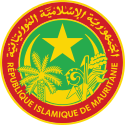Mauritanian Progressive Union Union progressiste mauritanienne | |
|---|---|
| Abbreviation | UPM |
| Leader | Moktar Ould Daddah |
| Founded | February 1948 |
| Dissolved | 1958 |
| Merged into | Mauritanian Regroupment Party |
 |
|---|
|
The Mauritanian Progressive Union (French : Union progressiste mauritanienne, UPM) was a political party in pre-independence Mauritania.